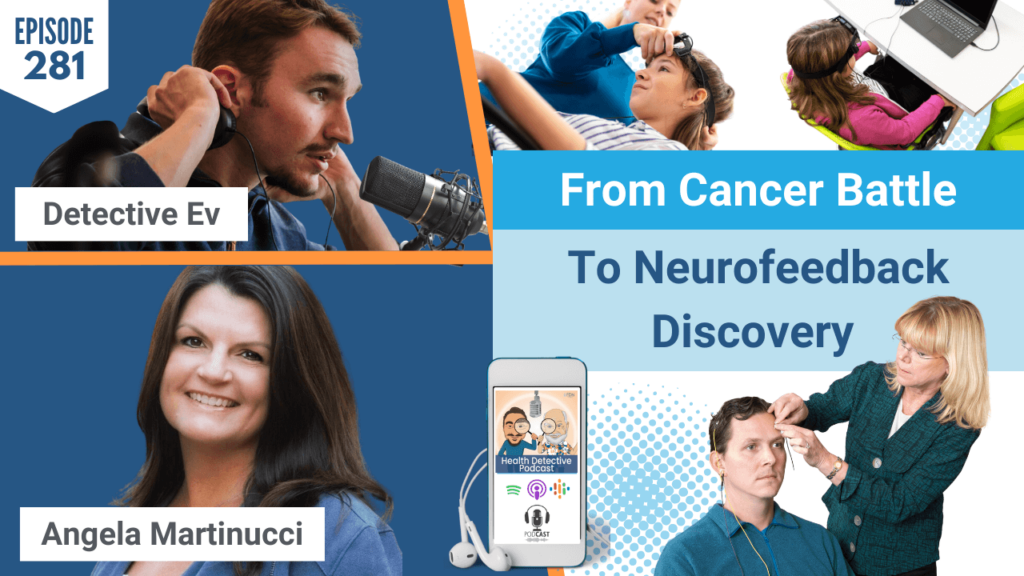Introduction
[00:00:00] Detective Ev: Hello everyone. Welcome to episode 281 of the Health Detective Podcast. This episode is about winning a cancer battle and a neurofeedback discovery.
I love talking to other people about their stories and what they dealt with in the functional medicine space, as well as what they saw in the FDN program. We are talking to Angela Martinucci. Angela is the founder of Mind Balance Neuro and co-founder of the Bay Area Brain Spa. Mind Balance Neuro is at the forefront of providing NeurOptimal® Neurofeedback rental programs and purchasing consultations.
Angela, a co founder of the Bay Area Brain Spa in the San Francisco area, is committed to making the benefits of biohacking and neurofeedback accessible to her local community. Her recent graduation from FDN marks an exciting integration of functional labs and coaching methods into her client services. Angela’s journey with NeuroOptimal Neurofeedback began with a personal transformation following a cancer diagnosis, igniting her passion for sharing this technology.

Over the past decade, she has worked with diverse clients, discovering a particular affinity for peak performers. Her work with a major league baseball team, professional athletes, and corporate neurofeedback programs has showcased remarkable benefits. Angela also finds fulfillment in assisting clients facing complex health challenges, making her FDN certification a natural progression in her quest to support their wellness journeys.
And finally, Angela’s commitment to community outreach and expanding neurofeedback access drove the establishment of the Bay Area Brain Spa. This endeavor facilitates cost effective group neurofeedback training sessions, extending reduced rates to public school teachers, children, first responders, and veterans.
Today, the business has blossomed offering a wide array of wellness technologies to enhance the wellbeing of its clients. Angela, welcome to the Health Detective Podcast, finally.
Neurofeedback Discovery: Finding a Lump
[00:01:46] Angela Martinucci: Thank you. That was a mouthful.
[00:01:48] Detective Ev: Yeah. How long ago did we talk now, man? It feels like it’s been a while.
[00:01:52] Angela Martinucci: It has been a while. Yeah, there’s been two iterations of the brain spa since the last time we spoke. We opened in 2020. I think we spoke some time in 2021 after I met Reed at the biohacking Congress event. I spoke at that event and met him there.
Then, yeah, we spoke sometime between then and now. We’ve moved and expanded the brain spa and added on a second time since then. It’s been quite a whirlwind.
[00:02:23] Detective Ev: It had to be at least a year and a half ago.
We got a lot to dissect today. Let’s start with how we always begin on this show. I’d love to know about when your health symptoms started and what they looked like at the time.
[00:02:34] Angela Martinucci: So, we would go back to 2010. I was in the shower and found a lump under my arm and thought, oh that’s strange. That wasn’t there last week. Went in to be seen at the doctor because I thought let me get it checked out. I had two young kids at the time. My daughter was almost three and my son was almost five. And so, I thought, okay let me just see what it is.
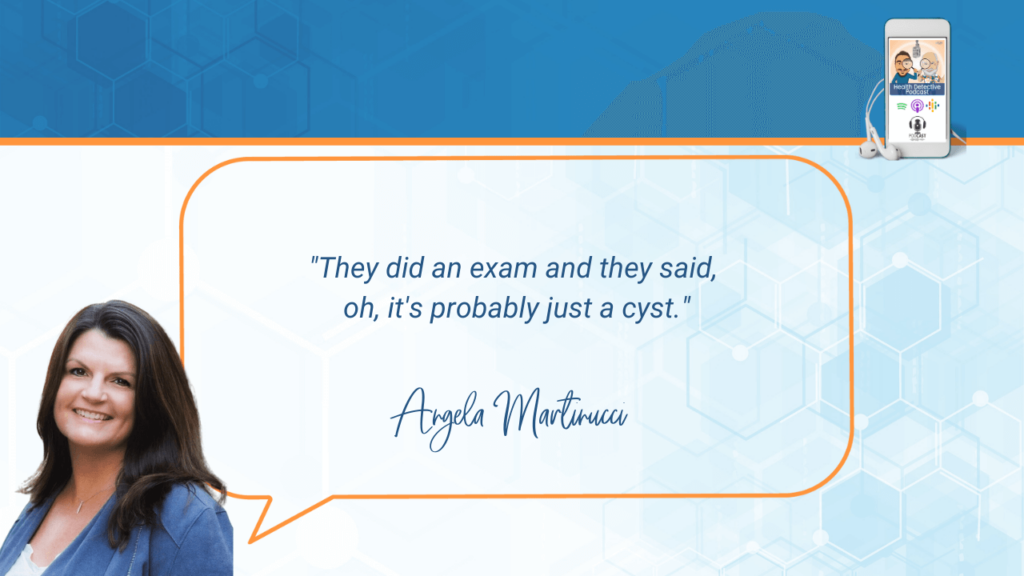
They did an exam and they said, oh, it’s probably just a cyst. Go home and cut out caffeine. And I thought, okay, I don’t know that I’m satisfied with that. But I’m 33 years old and I have no history of cancer. I just have no reason to believe that would even be in the picture.
Neurofeedback Discovery: Gut Intuition
I went home and followed their directions and then something told me, no, you should probably go back and be seen again. That’s when they did the ultrasound and mammogram and turned out to be stage III invasive breast cancer that was in my lymph nodes already by the time I was diagnosed. No symptoms because I was feeling well at the time.
I ended up having surgery pretty quickly. Threw my daughter in preschool overnight. Six months of chemo, radiation, other surgeries with complications. Other than the symptoms of chemo that were extremely awful and the symptoms of radiation, there was also symptoms that happened after all the treatments were done that were pretty devastating.
[00:04:06] Detective Ev: I think there’s a really easy part for people to miss there. I find it significant. You said you just knew that you should go back. So largely the reason that you got the diagnosis when you did is because you knew in your gut that something was wrong, and you went back. Is that correct? Yes, or no?

[00:04:23] Angela Martinucci: Yeah, exactly. If I had just blown it off and thought, okay it’s a cyst. It’ll go away at some point.
[00:04:31] Detective Ev: Yeah. And so, I like to have the balance between those things, right? I really want people to follow their intuition. The reason that I say this is because many people, when we ask, how did they get into the natural or functional side?
Literally 95 percent of the answers are, I just knew, gut feeling, divine intervention. It’s very odd trying to figure out why so many of those people had that same thing. To be fair, that’s my answer as well. I just knew that something didn’t make sense.
Neurofeedback Discovery: Healthy Nutrition
But I love encouraging this because, in your case, it’s not like you said, oh, I just know something’s wrong and I’m going to go to central America and go to an odd retreat in the middle of the jungle and start trying to heal myself. No. You said, I don’t know if this is right. What else can I have to lose, what, a few hundred bucks, from going to the doctor? Maybe that’s covered anyway.
You got the diagnosis, and thank God, because cancer’s a different beast, man. I always say that on the show. If that gets too far in, it actually takes over a lot of the mechanisms in our body that could heal us when we fast or when we do other things. So, you want to get that sooner rather than later. I’m so glad that you did.
As you’re going through these treatments and when you got this diagnosis, were you into natural or functional medicine at all or was there a completely different life and philosophy before all this happened?
[00:05:43] Angela Martinucci: No. I would say, I grew my own vegetables. I was an organic chef. So, I was consulting on gluten free and cooking for families with gluten free and special dietary needs. This was really prior to smartphones. It wasn’t a thing back then like it is today. No, that was definitely something that I was focused on health.
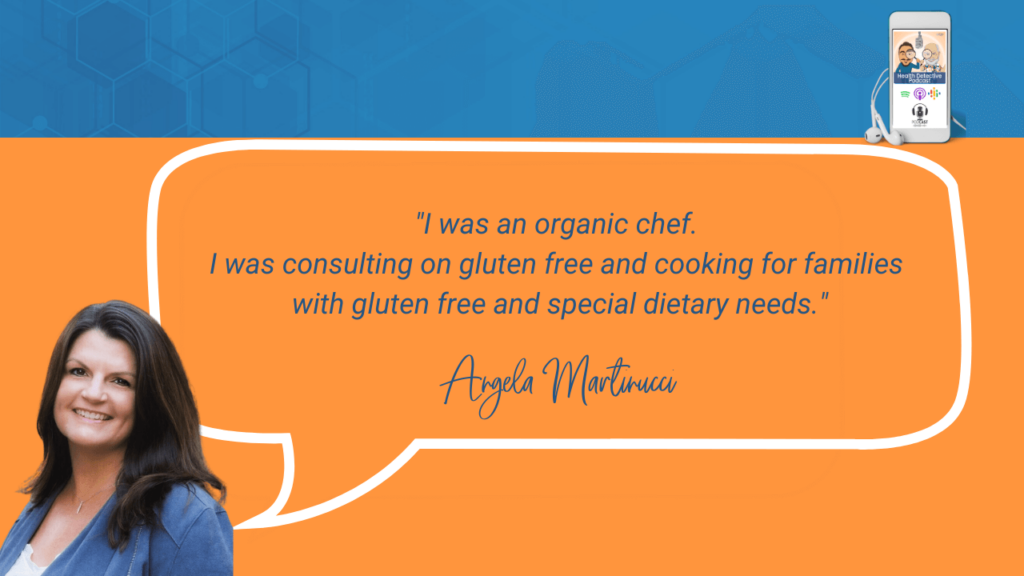
My background was in nutrition. And when I was diagnosed, it was all my friends saying, why you, why not me? I’m drinking Dr. Pepper and smoking cigarettes. Like you’re the one that’s cooking organic and paying attention to this and your babies eat all organic.
Neurofeedback Discovery: An Integrative Approach
Yeah, I wouldn’t say that functional medicine was something that I was aware of at the time. I wouldn’t say that just because I was healthy, young, and I hadn’t really needed to face anything that I needed to see someone for.
[00:06:37] Detective Ev: This is particularly interesting. I do not know that part of your story. Because again, you’re, by definition, living better than most people in today’s world, let alone whenever this was especially if it’s before smartphones. So really interesting.
Did Western medicine then get you to where you needed to go cancer wise? And was it the only treatment that you did since you were already aware of this more natural side of doing things?
[00:07:02] Angela Martinucci: I was in a healthcare system that was very broken. And I asked them what should I be eating during chemo? They said, it doesn’t matter. Just eat whatever you can get down because of the nausea and vomiting.
And I said I feel like I want to take supplements to support my body through this process. And they said, no. You’re not taking any supplements. It could interfere with the chemo. And so I actually found another doctor at the time.
I couldn’t go to them because of my insurance, but he was an integrative oncologist in San Francisco. I had one phone call with him and I just knew I’m paying out of pocket, I’m going here, I’m doing all the extras that he has to offer.

He has an amazing dietitian that focuses on cancer, a massage therapist, and an acupuncturist. So, I would literally get my chemotherapy and then drive across the bridge to go to his office to have all of the integrated approach. So, I just ignored doctor’s orders.
Neurofeedback Discovery: Having Questions
[00:08:02] Detective Ev: Well, you did, and you didn’t. You had a very fair request, and you were trying to do what was necessary and they said no.
The clear answer is that, and this is not medical advice, obviously not every supplement is going to interfere with chemo. Anyone with common sense knows that. And so, to say no supplements at all because of that is stupid. That’s wrong.
So again, this is a more of a common sense one to be fair. But I love this theme so far of the following of the gut. I talked to this person, and I’m sure they sounded good and had educated statements to make. But I love this whole idea of, oh, I just know I’m going to go to that person.
So, you’re following this like inner guidance almost this entire time. What did the next period of time look like? And I say, period of time, because I don’t necessarily know how long it was. Clearly, thank God you’re here with us today, which is wonderful. But what did that look like in the interim while you were healing?
[00:08:52] Angela Martinucci: Yeah, I mean, it was 6 months of chemotherapy, and it was pretty aggressive.
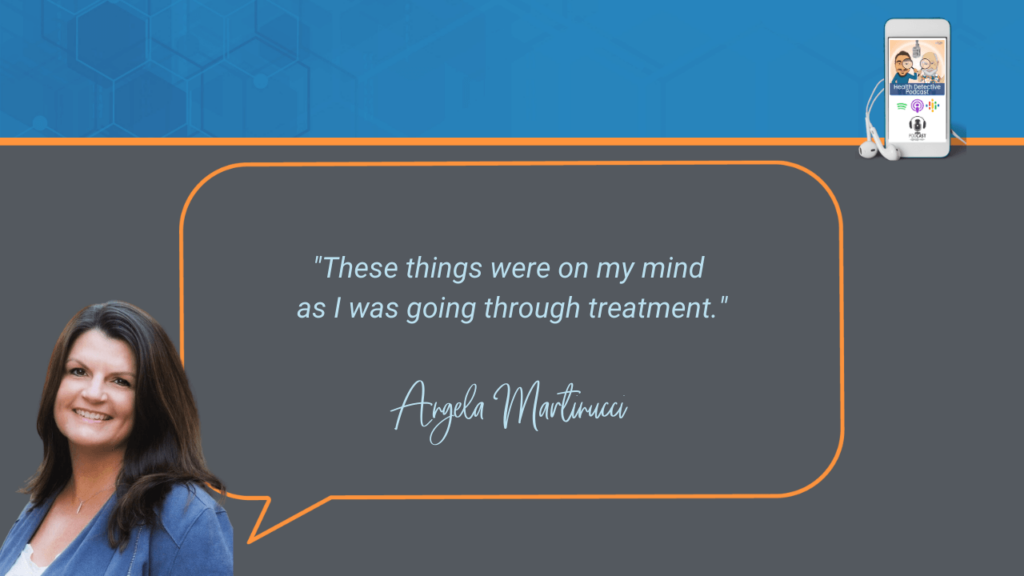
I was extremely sick on the chemotherapy. So thankfully, I had family around to help take care of my kids. Just thinking about, oh, this is poisoning my body and the same time wiping out what I knew was probably a relatively healthy microbiome and like, how do you restore this? These things were on my mind as I was going through treatment.
Neurofeedback Discovery: A Mix of Natural and Western
Then just the radiation, you sign off on this form. At the time I thought, okay, I have two little kids. I was scared to death. The cancer’s in your lymph nodes. All I knew of cancer was people that had died of cancer, right?
So, I felt like I had one foot in Western medicine and trusting that process, and I just gotta get through this and I’m also going to support my body. That was the dance I did throughout. It was a year of treatments and surgeries.
[00:09:47] Detective Ev: After that year though, was it a clear slate? They said you’re good?
Angela Martinucci: Yeah.
Detective Ev: Okay. So, you finish up this mix of Western and call it functional, we’ll call it natural, whatever. And you’re lucky enough and blessed enough to get this, hey, you’re good to go right now.
Angela Martinucci: Yeah.
Detective Ev: I’m sure that there must be a phase now where you’re going research mode or really changing your perspective. And it’s not literally that we’re arrogant in this space. When we’re doing the stuff that someone like you was doing, especially again, before smartphones, even before this was widely available online, you must have this idea that I’m going to be very healthy for most of my life. I’m certainly not going to get a cancer diagnosis in my early thirties.
Did this change your paradigm then in terms of what you were about to go do once you got this clean bill of health? Okay, I need to change some things up to figure out how this happened to begin with.

[00:10:37] Angela Martinucci: Yeah. And I would say for me, it was more like I was going through this and continuing with that gut feeling.
Neurofeedback Discovery: Anxiety, Depression, and a Black Hole
I felt like the whole time that, no, this happened to me for a reason. I’m meant to go through this for a reason. There’s something that’s going to come out of this journey, and I don’t know what it is in this moment, but I will find it.
So, after the cancer treatments and everything, all the meal delivery stopped, and all the support went away and they say, you’re good, unfortunately that part of the journey for most people going through cancer treatments, it’s like you end up like a dog that’s just been attacked. You’re just like, what now? Sitting there licking your wound, like what just happened to me?
You just go into fight or flight, and you get through it when you have to go through it. That definitely hit me like a ton of bricks, and I was definitely not in the headspace really to research or do anything for myself in terms of what’s next.
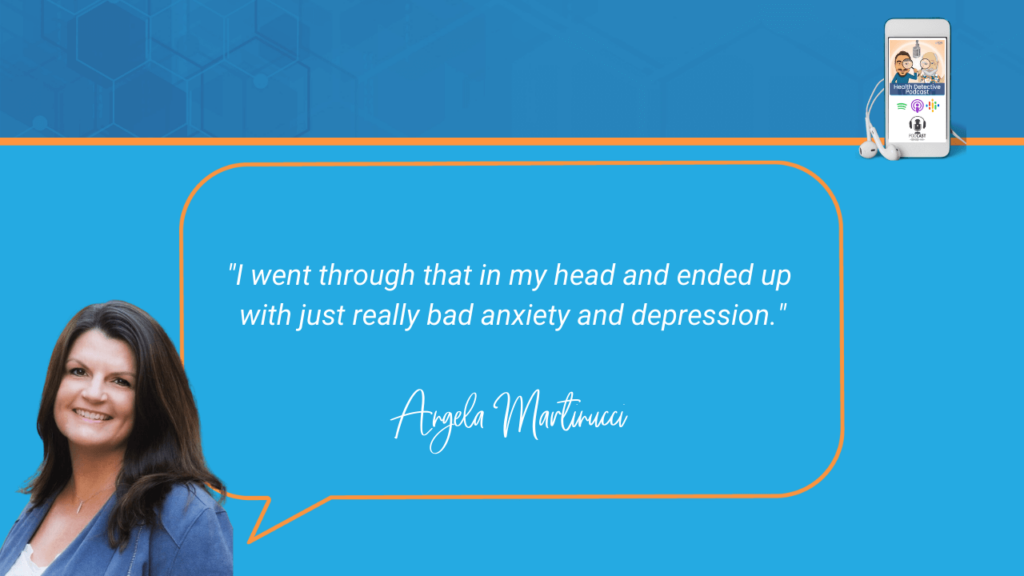
There was definitely a what’s next. I feel like part of that what’s next was, I ate organic, and I did all the things, and I ended up with cancer, so now what? I don’t feel like that’s the answer. I was let down by all these things I was doing that I thought were the right thing to do. So, I went through that in my head and ended up with just really bad anxiety and depression.
The chemo brain, it was like operating through a fog. I couldn’t remember, oh, did I leave the dog in the car? And I’m trying to parent two little toddlers at the time. So, just trying to get through the day I felt like I was in a black hole that I couldn’t see the light after that.
Neurofeedback Discovery: Discouragement
And I think a lot of it was my hormones were shut down, I had the toxin load. I know now all of it was going on. And then just the trauma to the nervous system of going through something like that.
[00:12:29] Detective Ev: I know there was obviously many factors contributing at the time. But from what I just heard you say, because I was wondering this already, was it discouraging in a sense then?
Because again, you did believe in all this stuff, and it almost seems like it didn’t work in a certain way. So, did that lower your belief or lessen your belief in these principles? I know that again, eventually you expand your horizons and say maybe I just need to learn more.
But I guess that’s got to be pretty humbling and scary in a sense where you think you’re doing something better than 99 percent of people and you still get the big C word, the scary thing that we don’t want.

[00:13:01] Angela Martinucci: Exactly. I had started a healthy cooking blog prior to the cancer diagnosis, and I thought who am I to advise people on healthy living? Look at where it got me. And so yeah, there was this real mind game that happened around that for sure.
[00:13:16] Detective Ev: Obviously you got to where you got today.
So, let’s fast forward then to whatever part of this story goes from the very understandable anxiety and depression that has multiple factors behind it. When does the light at the end of the tunnel start coming out where you start maybe realizing why this happened, some new things to do and implement? I’d love to hear about that.
Neurofeedback Discovery: Subtle Improvements
[00:13:37] Angela Martinucci: I remember sitting on the floor of my room, my aunt called. She said, hi how are you? And I said, oh, I’m fine. She’s like, you’re not fine. Have you heard of this thing called neurofeedback? I think that this might help you.
She had been through the Amen Clinics. And she had a brain tumor like 20 years prior and had learned about neurofeedback. So, she introduced me to that. She actually had equipment, so she let me borrow her equipment and I used it at home. I went a couple of times to a provider, but it was easier to just go ahead and do it at home.
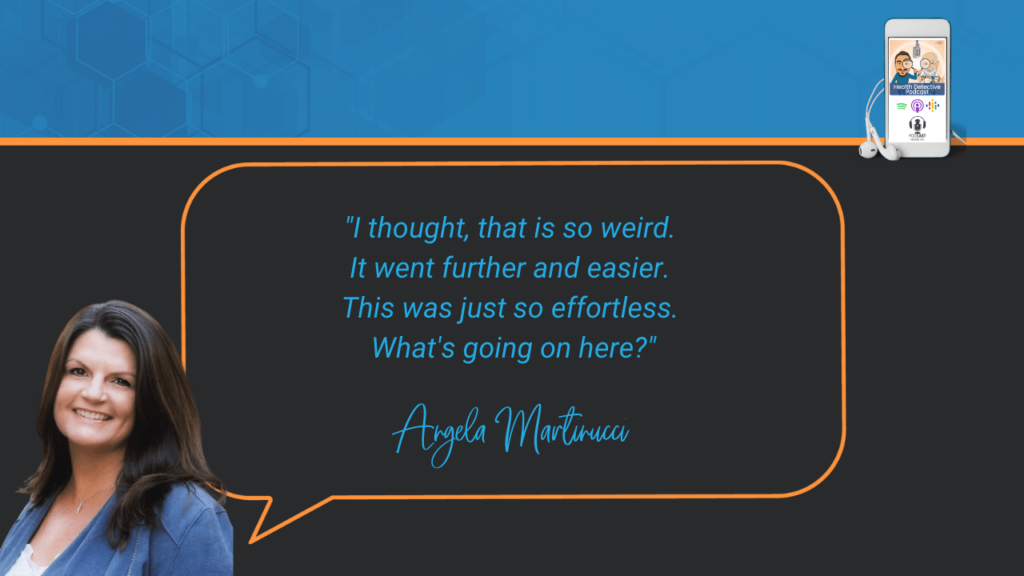
I didn’t really realize that it was doing anything positive, really, I didn’t think I was noticing any shifts from it. So, I played golf since I was 13 and it sounds like a really random side story. But I was out on the golf course with my husband and father-in-law, and I hit the ball. I thought, that is so weird. It went further and easier. This was just so effortless. What’s going on here?
Then I started to think, oh, that’s right. The founder said that he improved. Like he started golf when he was 50 and became a scratch golfer. Maybe something is happening with that neurofeedback. So, it was very subtle, seamless changes. I was dedicated to it because I didn’t want the handful of prescription meds that my doctor had offered me because that was the alternative. And I was grabbing for straws to get through the night. I also had insomnia.
Neurofeedback Discovery: Finding the Purpose
So, I had a cocktail of all kinds of things next to my bedside to try and just get through the night or be able to drive the kids to school and stay calm and regulated. I didn’t even notice how much better I was until I was on a retreat.
I was on the board of directors for a young survivor group in the San Francisco Bay area. So, we were on an overnight and all these women are talking about I gotta go take my Xanax and Ativan and this and that. And I went, oh my God, I didn’t bring anything with me. I’m sleeping through the night.
Like what happened to the anxiety? Cause it just so seamlessly went away that I didn’t realize how much better I was until I saw them. They were like a reflection of myself a month or two prior. That was when it hit me.

And it was interesting because on that retreat, we were having these conversations about why a cancer. I just remember feeling like it happened for a reason, I’m going to find it. It was funny that it was on that retreat that I was like, okay, I’m meant to bring this to this community. It’s not okay that these young women are going through this diagnosis and then handed a handful of prescription meds to function for the rest of their lives.
[00:16:10] Detective Ev: I wish everyone would even just give that a try. What I mean by that is, let’s say you don’t believe everything happens for a reason. That’s fine. What if you acted like it did?
Neurofeedback Discovery: NeurOptimal® Neurofeedback
I do believe a lot of these things happen for a reason to be clear, but I actually applied this other philosophy first based on the advice of someone else so I didn’t come up with this. But it was just like, why don’t you just pretend that these things happen for a reason? And I realized the real gift in it is the way of thinking changes.
You were looking almost for these opportunities to find some validity to what this was and why this happened. And then it creates a very positive experience out of something that is otherwise, not even just negative, downright traumatic. So, whether that’s real or not real, I can see both sides of it. I’ve been on both sides of it. Who cares? Act like it is and watch what happens to your thinking and the gratitude level that you have when you approach it that way.
So, let’s define neurofeedback. Because admittedly, I think the only time I’ve really ever talked about this is with you and we already identified that was at least a year and a half ago when we were getting to meet each other. I don’t think I retained much is my point. So what is neurofeedback?
[00:17:15] Angela Martinucci: There’s different types of neurofeedback. The neurofeedback that I work with is called NeurOptimal® Neurofeedback in case any of your listeners are familiar. But it uses EEG sensors to measure cortical activity.
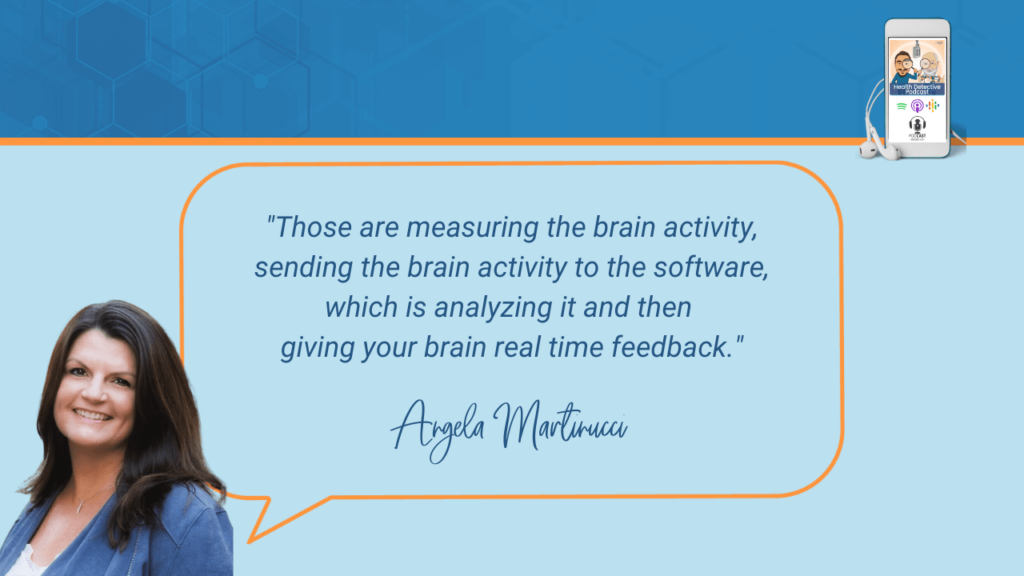
This particular software, it uses two little sensors on the head and then ear clips. Those are measuring the brain activity, sending the brain activity to the software, which is analyzing it and then giving your brain real time feedback.
Neurofeedback Discovery: Self-Correcting & Self-Regulating
It’s really being able to put the brain in front of a mirror. When the brain can see itself in real time, it’s prompted to self-correct and self-regulate. Just like when we look in a mirror, oh, my hair is out of place. Nobody told me. Yeah, my hat’s crooked. Like we immediately start making corrections. Or we look at ourselves in the mirror, we might go, eh, yeah, today’s not my day and just keep walking.
The idea is that it’s not entraining the brain in any way. It’s just giving the brain information and allowing the brain to decide whether it wants to be prompted to self-correct and self-regulate.
[00:18:17] Detective Ev: We got to dissect that because that’s something I’m still admittedly confused about. I get the analogy totally. I look in the mirror every day. I’m like it’s about as good as it’s going to get and I accept my fate. There are times where maybe I get a little confident, believe I can change a thing or two. And so then I try to start to self correct.
Is that literally what’s happening? Like the brain doesn’t need any other prompt other than just seeing this?
[00:18:39] Angela Martinucci: Yeah. The participant is listening to music and the feedback is audio. So, you’re hearing little pauses in the music. It almost sounds like a record skipping. Most of your followers probably don’t know what a record is or know that sound, but little crackles or skips in the music.
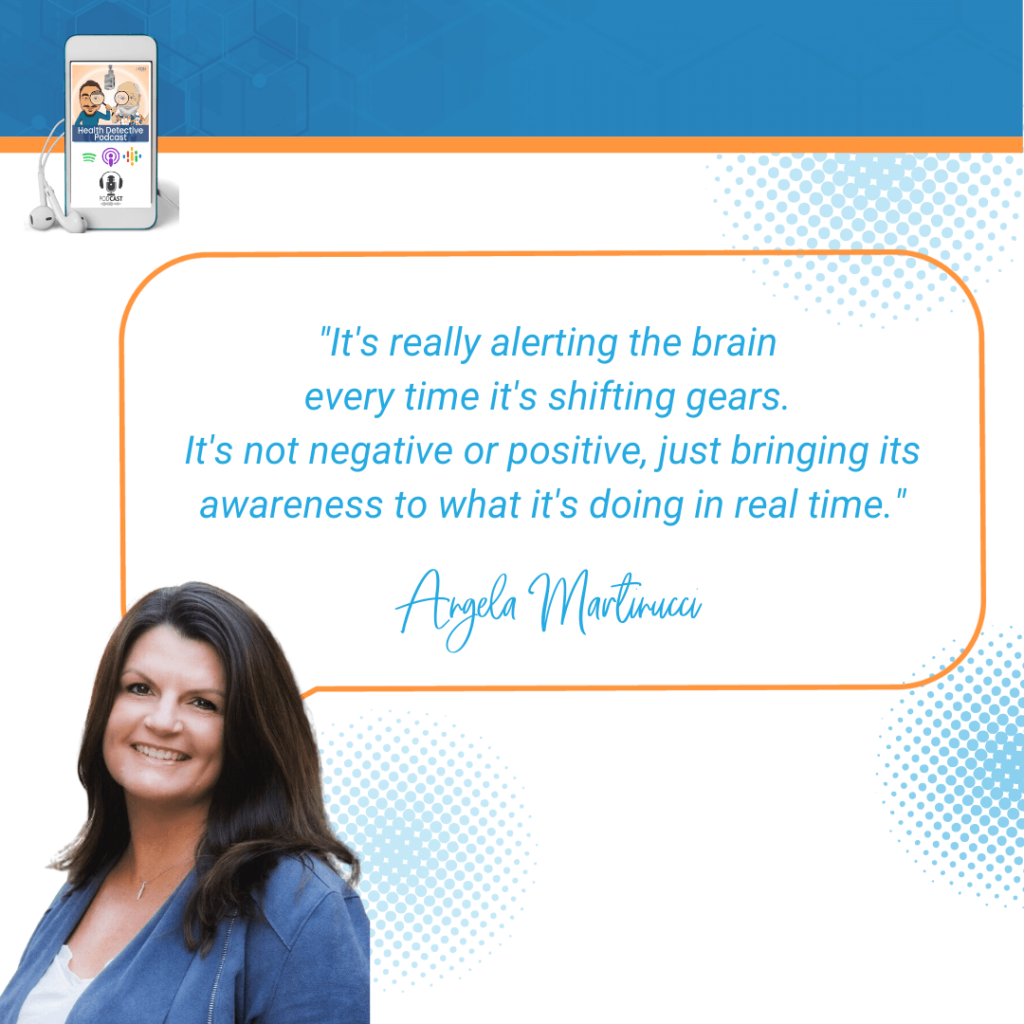
Those are what is alerting the brain – hey, pay attention. Something just happened here. So, it’s really alerting the brain every time it’s shifting gears. It’s not negative or positive, just bringing its awareness to what it’s doing in real time.
Neurofeedback Discovery: When Are You Done?
So yeah, the brain will self-correct and self-regulate. I’ve seen it with my kids. For example, they started doing it when they were really little. They were, I think, going into first and third grade. So, they used to sit and play Legos and do a neurofeedback session.
The next day they’re making their bed and they’re not fighting. And I’m like, okay, I guess it’s working. Cause I didn’t tell him it was going to help them in any way. But that’s how their brain organized itself and how it showed up for them.
It looks different for different people, but the idea is that it’s training. So, each time the brain has this neurofeedback session, it’s this opportunity for the brain to be more calm and regulated. And with time it builds resilience and flexibility.
If you were to sit for thousands of hours of meditation, that would build this resilience and flexibility in the brain. So, it’s like a hack, but I feel like it goes deeper. It resolved my lifelong anxiety that I didn’t know really that’s what it was and insomnia.
People will say when are you done with neurofeedback? I don’t know. Maybe you’re coming in for sleep issues and your sleep issues go away. But maybe you have something else going on that could have improved if you kept going.
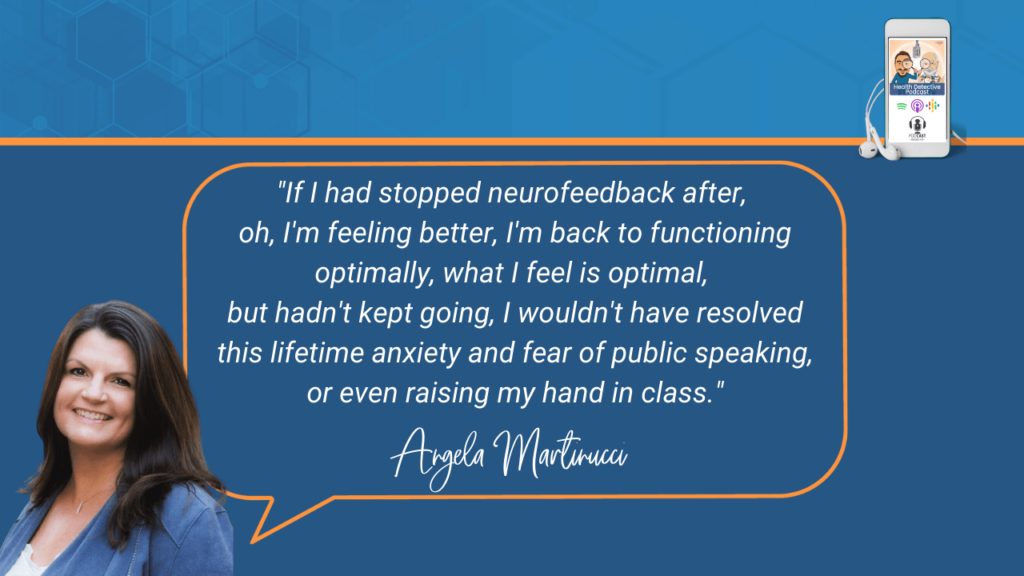
If I had stopped neurofeedback after, oh, I’m feeling better, I’m back to functioning optimally, what I feel is optimal but hadn’t kept going, I wouldn’t have resolved this lifetime anxiety and fear of public speaking, or even raising my hand in class. I had debilitating anxiety that went away after I continued to train. So, it’s a really profound process.
Neurofeedback Discovery: What a Session Looks Like
[00:20:57] Detective Ev: Yeah, it sounds it.
So, what does this session literally look like? I understand the audio component, and I could just be speaking for myself, but we actually have a decent live audience today, which is great. Most of our audience is on the audio side, so they must love the title and be interested in this.
I think what I’m missing right now is I wouldn’t have originally envisioned that I could be doing Legos at the same time as doing this. So, is this just a headset? Is it happening in the background? I’d love to see what this looks like.
[00:21:23] Angela Martinucci: Yeah, it’s totally passive. You have five sensors on.
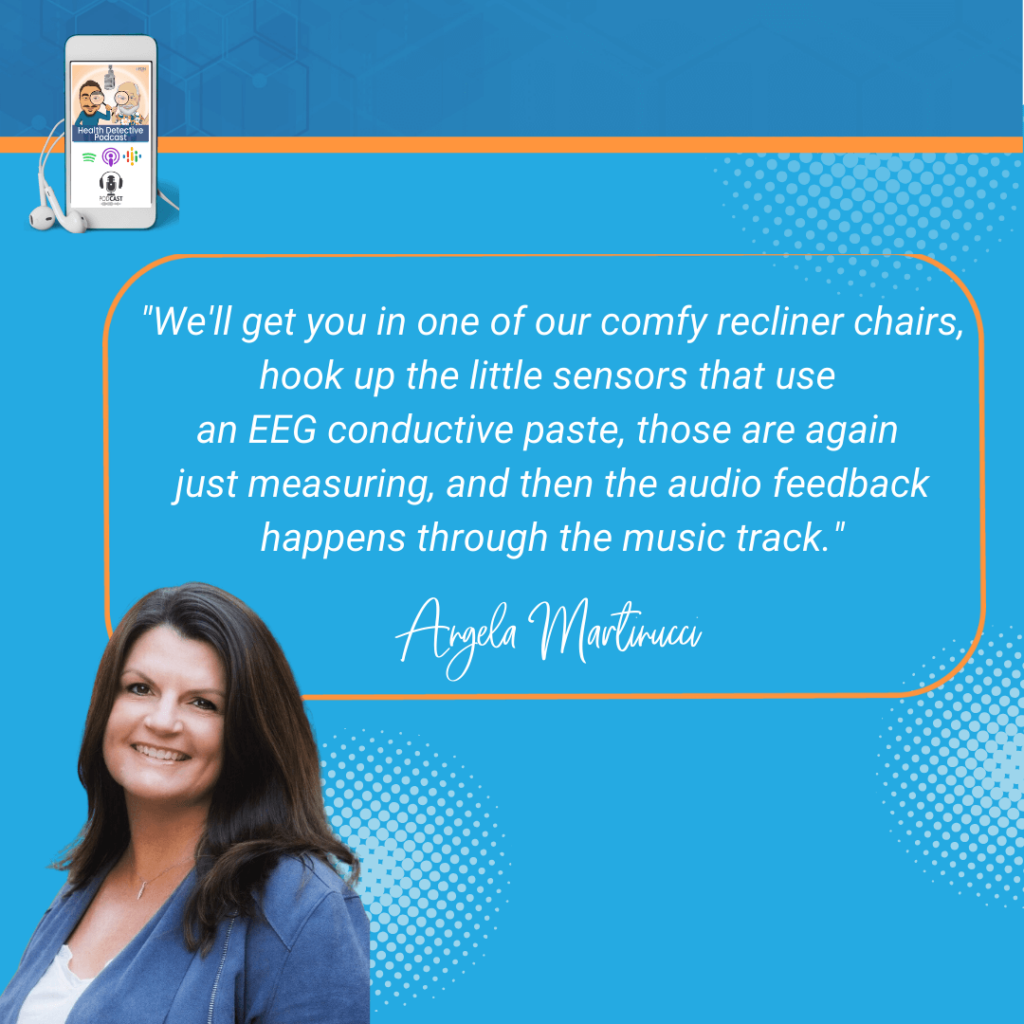
So, say you’re coming into our center at the brain spa to do a neurofeedback session. We’ll get you in one of our comfy recliner chairs, hook up the little sensors that use an EEG conductive paste, those are again just measuring, and then the audio feedback happens through the music track.
The participant is just literally relaxing back in a recliner chair with a blanket on. They can have a book, they can not be on their phone if they want to. Obviously we encourage them to check out from screens. You start where you start.
And our kids that come in, we can also load movies on the tablet so that the feedback is in the movie and the audio stream. They’re able to come in and watch Toy Story for half an hour. We’ve got plenty of kids that will come in and do that. Really, if kids aren’t regulated even enough to sit down and watch a movie, they can sit and play with blocks or anything that keeps them relatively still in a chair.
Neurofeedback Discovery: Tying in With the Cancer
[00:22:21] Detective Ev: Where does this come into, if at all, maybe, the cancer story? Because obviously, again we already discussed one of the things that would very naturally happen to someone who went through what you went through. Where did I go wrong? I thought I was doing everything right. So, what the heck happened here?
But where does the neurofeedback play a role in maybe that discovery journey of how the heck did someone who is living better than most people end up getting a cancer?
Maybe it’s not fully connected. What I was trying to understand is certainly you would have gone on some type of journey in terms of trying to figure out how did I even get cancer because you’re healthy now. You’re here with us today, thank God. So, you must have changed something in the right direction.
I didn’t know if the neurofeedback was just a part of that or the neurofeedback helped you identify directly or indirectly what habits or what thought patterns led to the cancer to begin with. That’s what I guess I’m trying to figure out.
[00:23:11] Angela Martinucci: Yeah. I’ll say certainly it helped me with the peace of mind of feeling less anxiety around another cancer diagnosis. And I think that was because I just feel like it gave me this sense of purpose. We know that sense of purpose is huge in terms of health and wellbeing.
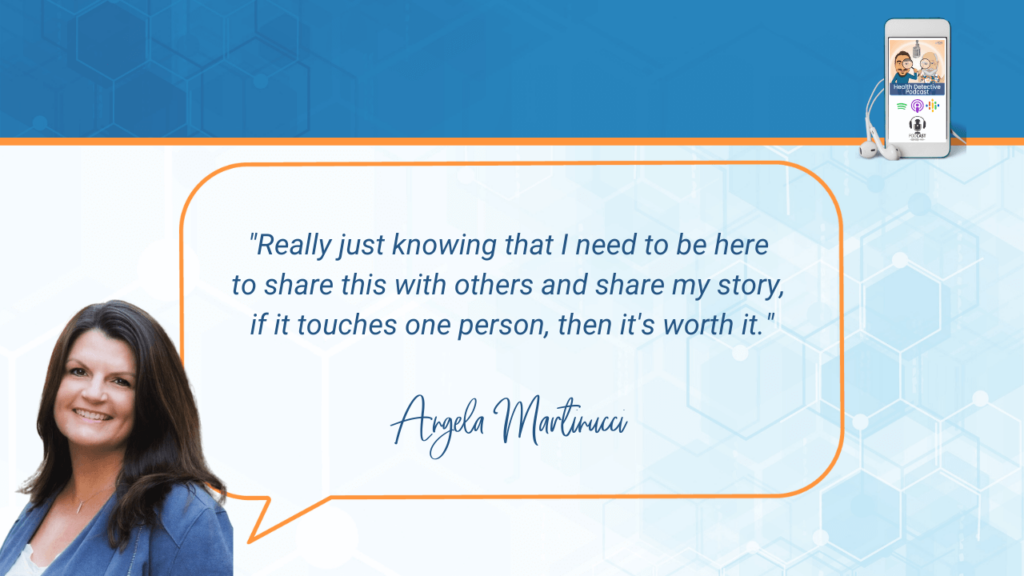
Really just knowing that I need to be here to share this with others and share my story, if it touches one person, then it’s worth it. I think that’s how the neurofeedback comes into the picture and ties with the cancer.
Neurofeedback Discovery: The Central Nervous System
There are thousands and thousands of people out there suffering, probably millions in this country, that are going through a cancer diagnosis like the clients I’ve worked with – attorneys that can’t go back to work because their brain isn’t functioning. So, if somebody hears this that’s struggling with word recall and whatnot, this can help.
I don’t think many practitioners out there actually know that there is something that helps with chemo brain, or a lot of these symptoms post cancer.
[00:24:16] Detective Ev: Yeah, I’m learning about it myself.
Actually, we have a question here. “What have you seen in your own life as a positive of the neurofeedback?” I know we talked about the anxiety. You’ve been doing it for a while. What are some of the positives outside of the anxiety?
[00:24:29] Angela Martinucci: I like to think of it for like the central nervous system. There’s this spectrum, right? And when the central nervous system is dysregulated on this end and very regulated on this end, we can have all of these symptoms. Those symptoms might be anxiety or redundant thinking or lying awake at night or brain fog or all of these different symptoms that can happen because the central nervous system is dysregulated.
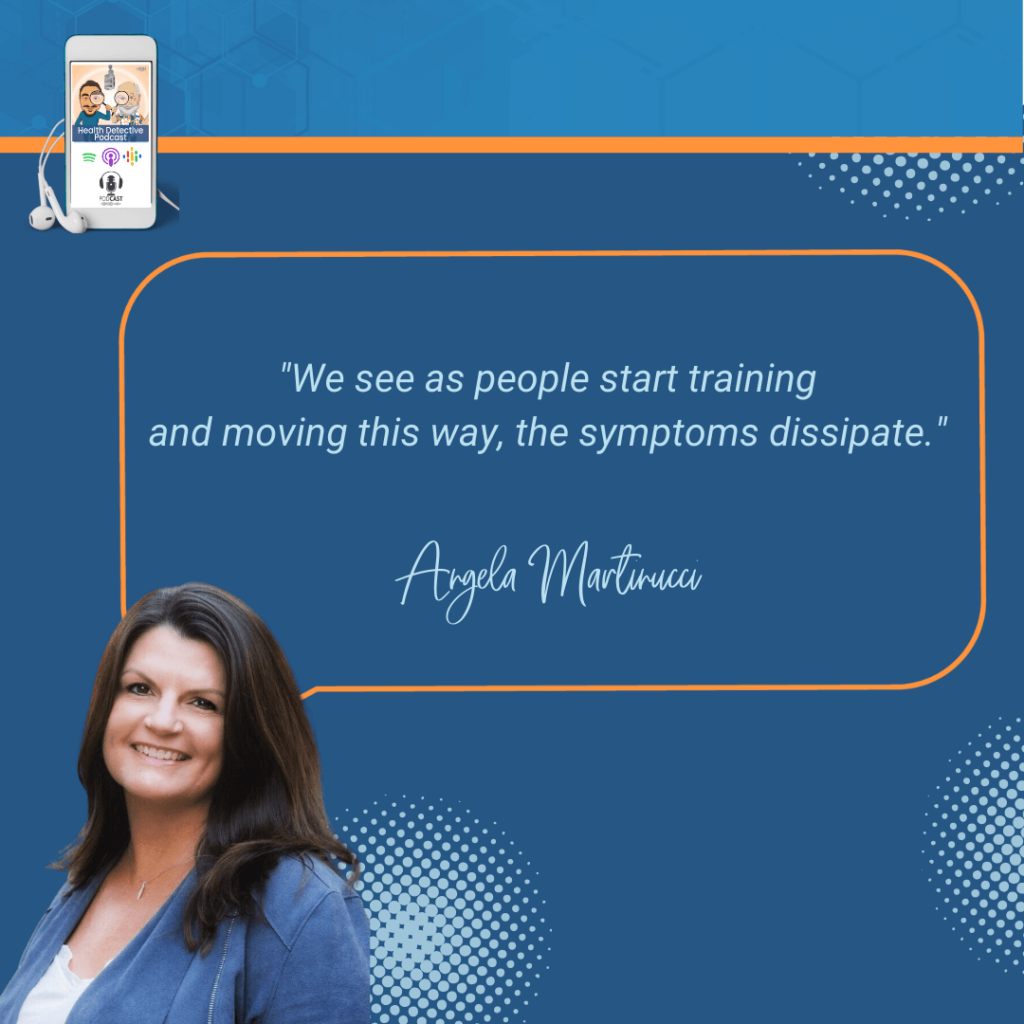
We see as people start training and moving this way, the symptoms dissipate. That’s not always the case, but I’ve worked with countless people. What happens over and over again, they feel more calm and regulated.
And then thinking about most of our suffering happens as a result of thinking about tomorrow or cycling over the past or worrying about this thing or that thing. The more that you are able to stay calm and present, the less suffering happens, right?
Neurofeedback Discovery: Calming & Regulating
So, even when you’re dealing with a chronic health condition, a lot of the suffering is, what is this? What’s going to happen? Just a lot of it is in our head. Not that the condition is in our head, but to get out of our head thinking about the worst-case scenarios can really create changes.
For me as I started training again, all my symptoms went away that I was dealing with. The insomnia, I sleep like a baby every night and that was not the case years prior, even prior to the cancer diagnosis. Then again, the anxiety around speaking or ever going in front of somebody like that would just be like, no way, never. I would never be speaking to you right now, and here we are.
I just think stress resilience, it keeps you calm and regulated. Both of my kids started training really young. They’re a junior in high school and a freshman in college right now. And they absolutely love it.
For them, it was like, my son would have probably been diagnosed with something on the ADHD spectrum. His teachers would say, if he could just sit in class, if he would stop putting pencils in his ears. As soon as we started training him with the neurofeedback, the teacher grabbed me, she’s like, what happened to this kid?
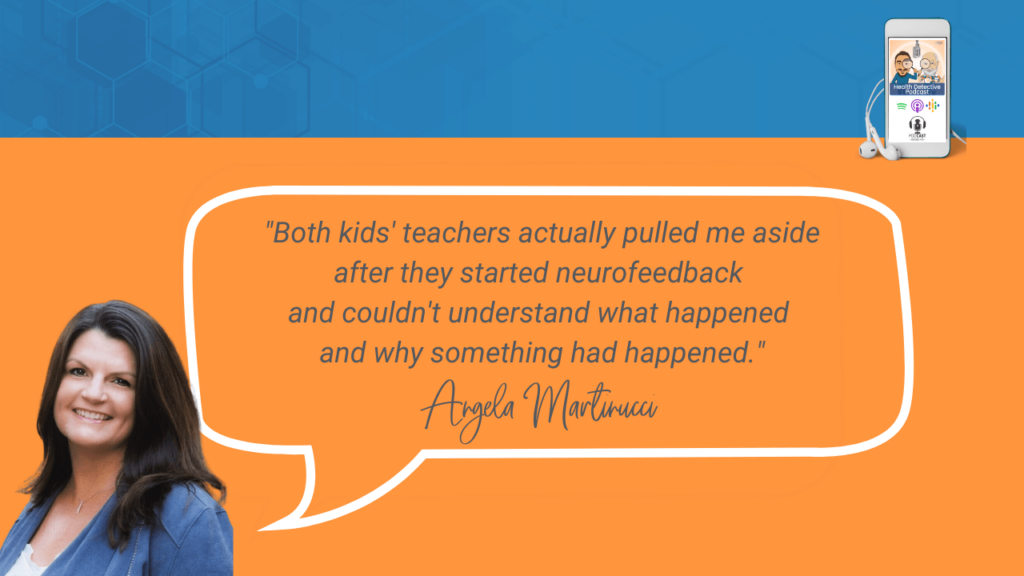
And I thought, Oh no, now what? But she said, Oh no, I don’t understand, he’s like a different little boy. He’s focused and getting his work done. Both kids’ teachers actually pulled me aside after they started neurofeedback and couldn’t understand what happened and why something had happened. My daughter’s reading and writing had blossomed.
Neurofeedback Discovery: Linear Vs. NeuroOptimal
I also saw it in their performance. My daughter’s been an Irish dancer competitively since she was about five. She noticed it in her presence on the stage. So, she used to be extremely shy and just hold on to my leg. It allowed her to be more outgoing and confident on stage. She would do neurofeedback before a competition.
My son as well with baseball, and myself with golf. That’s where the neurofeedback for athletes came in. I started working with athletes as a result of seeing how it affected my golf game and the kids sports as well.
[00:27:28] Detective Ev: I’m assuming there’s some science behind this. How did this come to be? This isn’t something that an individual just randomly thinks of.
[00:27:37] Angela Martinucci: Neurofeedback has been around since the sixties. It’s been used by NASA. Different technologies have been developed as a result, just different iterations as technology advances.
The founders of NeuroOptimal were pioneers in the linear neurofeedback. Linear neurofeedback is different than NeuroOptimal in the sense that you are targeting something. You’re giving the brain a specific protocol, let’s just say. So, the person has anxiety, we’ll put them on the anxiety protocol, which is up training or down training certain frequencies of the brain.

Whereas the founders of NeuroOptimal, Val and Sue, they saw that there was this overshoot, this level of self-correction that the brain would do on its own. So, they figured out, instead of telling the brain what to do, they figured you could just show the brain, mirror back to the brain, what the brain is doing, and the brain would self-correct and self-regulate on its own. It knows what to do, right? It’s just really tapping into the intrinsic wisdom of the central nervous system.
Neurofeedback Discovery: Innate Healing Ability
[00:28:36] Detective Ev: So cool. Chiropractic medicine and these all seem so different on paper. But when you look at the similarities, what I’m fundamentally seeing here in terms of how it relates to FDN is if you can calm someone’s body, if you can help them actually get into this relaxation mode, the parasympathetic and truly not overthink things, that’s when you’re going to give your body a chance to enable or enact its innate healing ability, which is not woo-woo, not hippy want-to-be science.
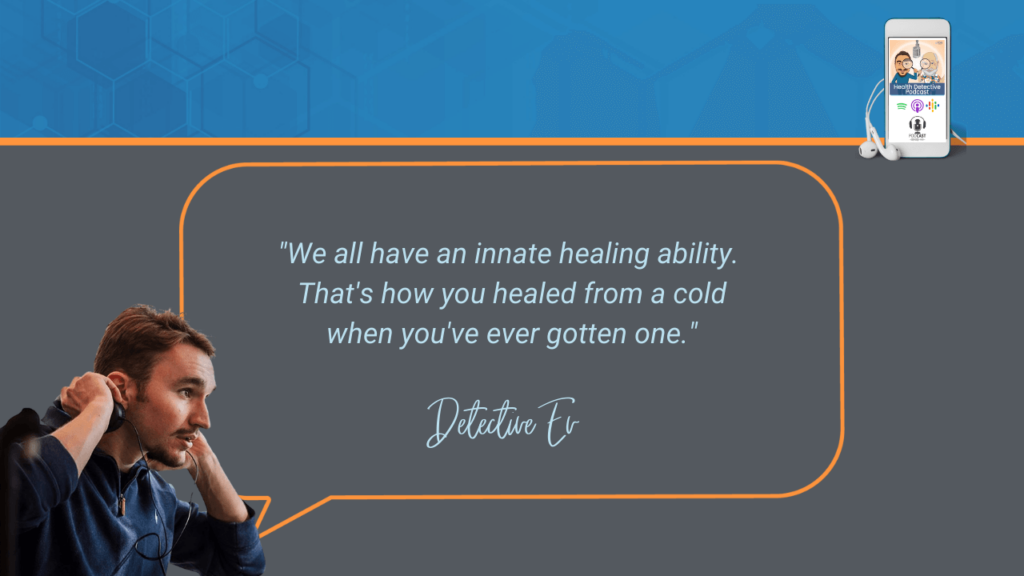
We all have an innate healing ability. That’s how you healed from a cold when you’ve ever gotten one. That’s how you healed from the paper cut. So, it’s almost allowing these things to happen for more major things, like whether it’s a cancer diagnosis, autoimmune issues, skin issues, whatever it might be. Really fascinating stuff.
And then you had mentioned in your bio, FDN was a natural progression, just wanting to continue your learning and add more services to people. But I am curious. So, you found out about us at the Biohacking Congress, is that what it was?
[00:29:33] Angela Martinucci: I actually found out prior. So, I started doing some research because with my clients, I’d say something about, yeah, you should go get a DUTCH test.
And honestly, back to my journey, frustration with my journey after the cancer diagnosis, really trying to be like, why can’t I deal with this issue or energy, or, oh, you might have a mitochondria problem. But I don’t know, we don’t know what to do with it. You could try this, or we could do this test and it was just like playing Whac-a-Mole. I’d spend thousands of dollars not getting anything that was like, okay, do this program.
Neurofeedback Discovery: The Brain’s Capacity
Seeing my clients only get so far with just the neurofeedback alone, but then, okay, I can see you could use more support at a cellular level or with your hormones. Maybe go see this person and get a DUTCH test. They’d be like, who do I see?
I didn’t really know anybody that I wanted to refer to that I was confident referring to. So, for really personal reasons and my family and just wanting to maybe bring it in house and help my clients with the labs, I started researching functional medicine, can you do it with a nutrition degree? Like how would I go about that? Then I think I had come across FDN. And then I met you guys at the conference. Okay. This is it.
[00:30:54] Detective Ev: Then just a nice disclaimer for consumers here, because I feel like it’s actually the consumer’s fault more often than it is the person preaching it. Neurofeedback is a cool tool, it’s not a cure all for everything. That is not what we’re promoting here today.
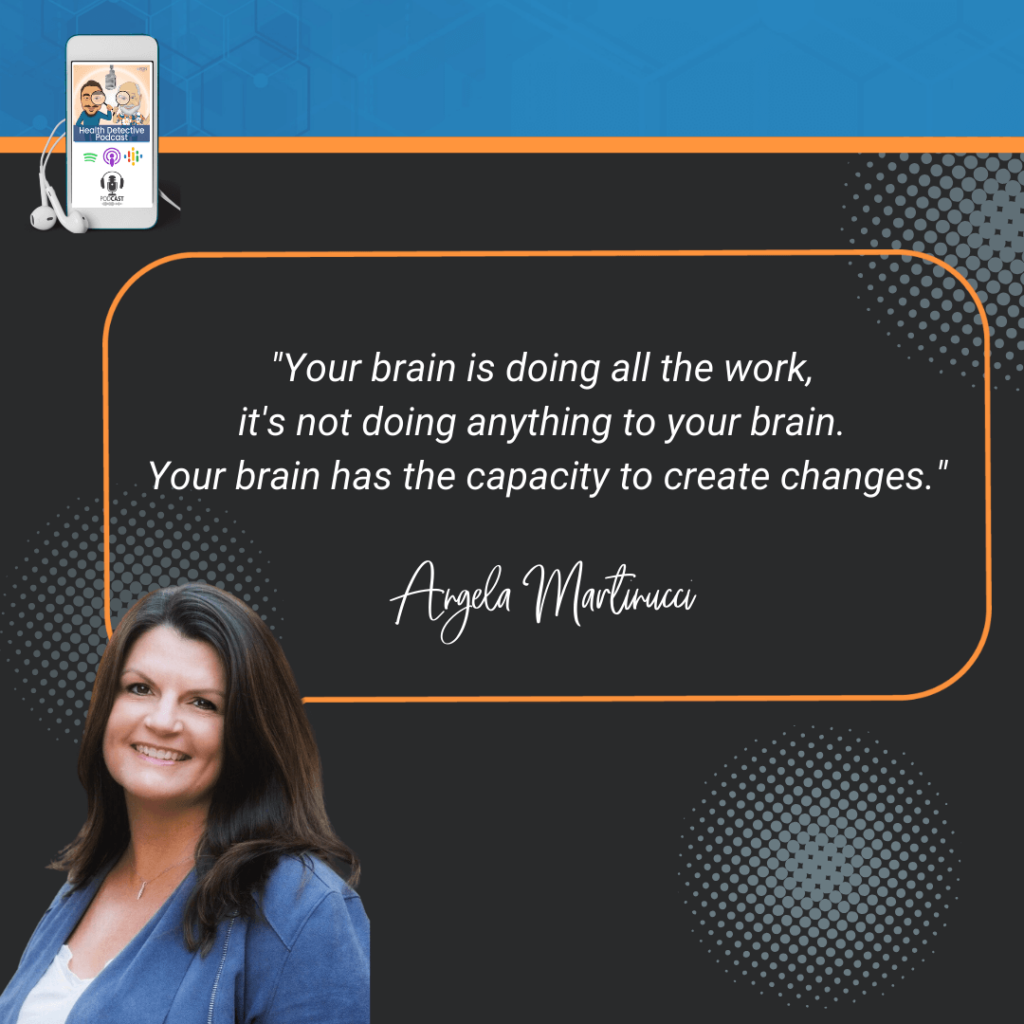
[00:31:07] Angela Martinucci: It’s not a cure all. It’s actually just a general wellbeing product. Your brain is doing all the work, it’s not doing anything to your brain. Your brain has the capacity to create changes.
Like you said, it’s main thing is that it comes and regulates the nervous system. When you calm and regulate the nervous system, it changes so much for people.
[00:31:27] Detective Ev: Excellent. For those that don’t know, we include labs in the cost of tuition. You get to have insights into your own health while going through FDN. You get one-on-one mentorship sessions not only to help with the course content, but to go over the lab results as well.
Neurofeedback Discovery: Running the Labs Regularly
So, what happened on those? You’ve been in the space for a while, doing your thing. Was there room for improvement? For most of us there is, right? There’s no shame in that. It’s usually the case. But what did you find while you’re going through the FDN course about your own health?
[00:31:55] Angela Martinucci: Yeah, definitely room for improvement, for sure. That’s a lot of the reason I decided to join the course is I want to understand these labs.
I wanted to be able to run them on myself and be able to create these changes in my diet. And I just loved the concept overall of minimizing the hidden stressors. The impact of that alone is just so profound. That’s not talked about enough going to functional medicine or whatnot. Just that alone has such a huge impact without adding in the supplements.
So, for me, definitely the GI MAP was very interesting. And I’m due for another one after going to Mexico and getting a parasite, which I think is a parasite, whatever.
[00:32:40] Detective Ev: Interesting. I appreciate the transparency.
Plenty of people come into the world of FDN. We’re amazing at helping people who are really sick, but we’re also amazing at helping people who are doing okay and want to find these other things, dot the i’s cross the t’s.
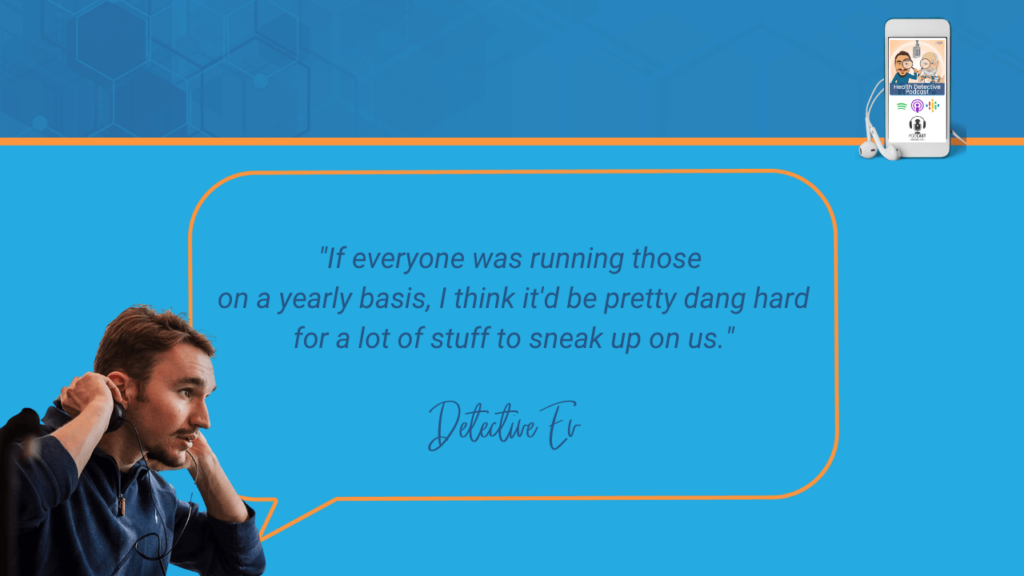
It might be a bold statement, so again, this is not a medical thing. But I would imagine that if everyone was running the foundational FDN labs, it’s one of the reasons I believe in this so much. If everyone was running those on a yearly basis, I think it’d be pretty dang hard for a lot of stuff to sneak up on us.
Neurofeedback Discovery: The Cancer Story
If we can see the way our hormones are going, if we could see our detoxification ability, and the way the gut’s dealing with things or not dealing with things sometimes, I just think it’d be a lot harder for most things to catch up on us.
I’m so glad that you got to see that now because I’m sure you have in your mind like, I’m not going to let this thing happen to me again. And I think with all the things that you’ve done and are doing you probably won’t ever let these things happen to you. It’s amazing that you beat this and then came out on top. The cancer one’s a lot different than many of the things.
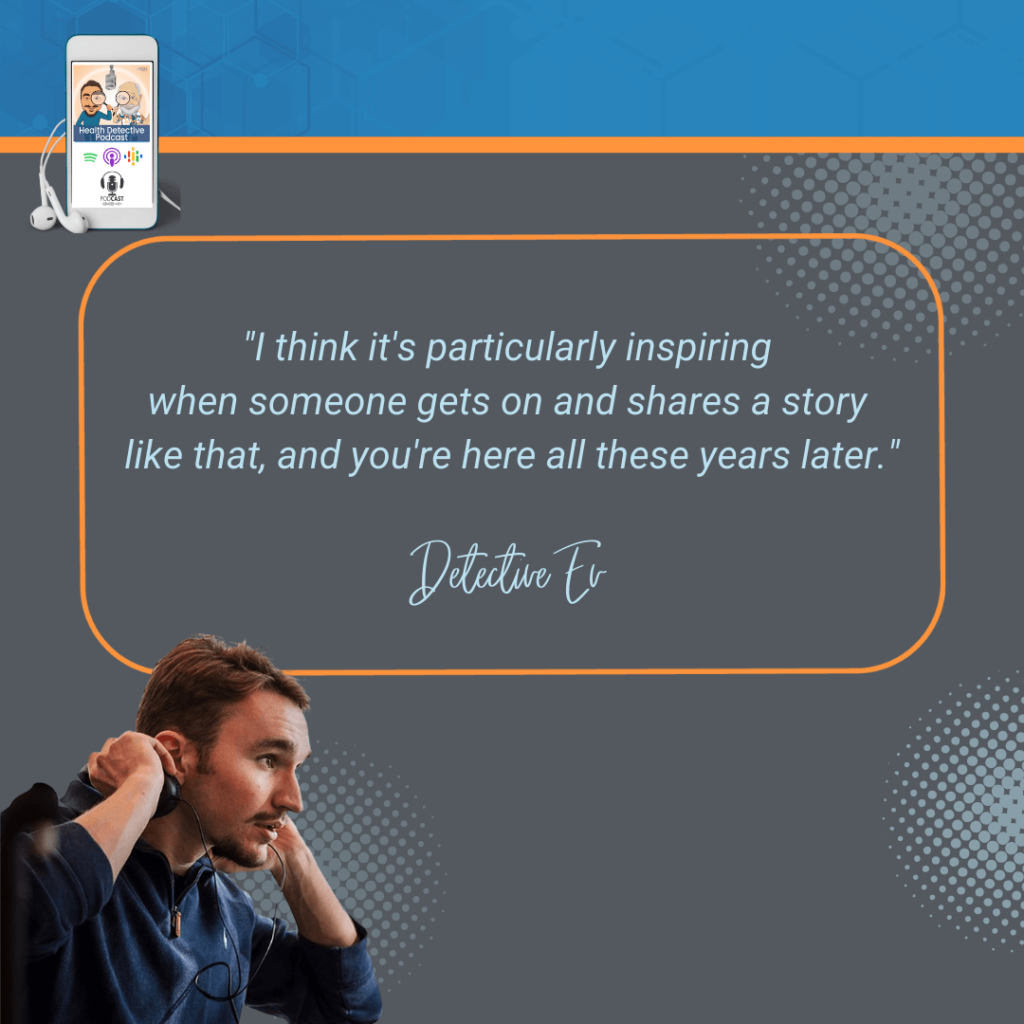
There’s, I’ll put it this way, less stories on this show about cancer than virtually anything else, right? Tons of autoimmunity, tons of skin and gut issues, it’s a little less common with the cancer. So, I think it’s particularly inspiring when someone gets on and shares a story like that, and you’re here all these years later. Because again, if we’re going back before smartphones, you’re talking, this is at least a decade plus since the diagnosis, correct?
[00:34:00] Angela Martinucci: Yeah, so 2010. It’ll be 14 years in February that I was diagnosed.
Detective Ev: Pretty darn good my friend.
Angela Martinucci: Fourteen years ago this month that I finished chemo. It may even be today the anniversary of finishing chemo, honestly.
Detective Ev: Pretty dang good.
Neurofeedback Discovery: The Gap
Angela Martinucci: Yeah.
But to your point, it just jogged my memory about after a cancer diagnosis and applying the principles of FDN. If you go through a Western medicine treatment protocol, we see these people all the time at the brain spa where they come in and it’s, oh yeah, I’m done with treatment. But what does that mean?
You’ve been cut, burned, and poisoned and the cancer is not there right now, but what are we going to do between now and moving forward? I think there’s a huge opportunity to really look at people coming out of cancer treatment. There’s just this gap.
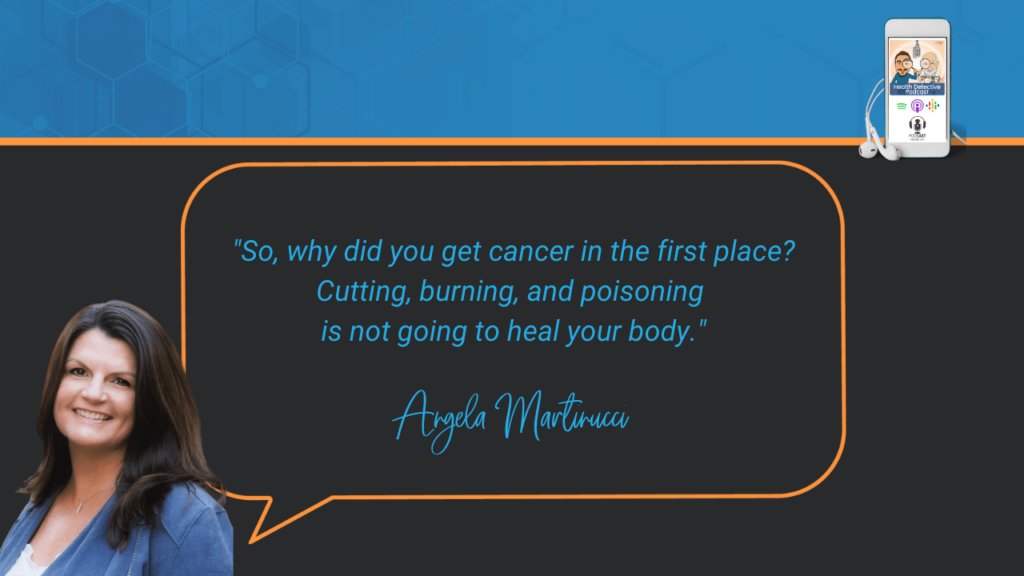
So, why did you get cancer in the first place? Cutting, burning, and poisoning is not going to heal your body. I know there’s a lot of FDNs out there, hopefully some are listening. But there are a lot of people that need support in that area. I’ll just plant that seed there that I think that they’re just left to, you’re fine. You might be on this hormone thing for the rest of your life or whatnot.
[00:35:18] Detective Ev: We had a woman named Annie on a couple of episodes ago and she was not into the functional medicine/natural medicine thing at all before her cancer diagnosis. She actually talks about that specifically and supports people in that area post chemo – now what?
You’re right. It’s oh, I’m done treatment. Another way to say it is okay, yeah, you survived. How do we keep you thriving long term? That’s really the key here.
[00:35:40] Angela Martinucci: Yeah. The effect of those treatments, right? At the brain spa, we see a lot of people post treatment. And we have all of our biohacking tools, but that’s like another thing.
Neurofeedback Discovery: FDN Program + Neurofeedback
Are they still using toxic household cleaners? Are they eating processed foods, the seed oils, like what is happening still that they haven’t made those changes? So, how can we also help them implement and run the tests and see what’s going on and how can we support them outside of all the different biohacking tech?
[00:36:12] Detective Ev: Yeah.
Jenny commented, she has thyroid cancer. She’s been cut, radiated, still have tumor markers too high. I’m sorry to hear that, Jenny. There’s a bunch of great stuff on this podcast. Hopefully it can help. And obviously you wouldn’t be watching something like this if you weren’t already doing your own research. I hope we can help in any way with the free information that we are able to share.
Angela, so how is this going to look for you now being one of the rare FDNs, like ourselves with an in-person business where we actually offer services there, but then also the FDN thing? Is it just like a new offering in your spa, or is it just online? What does this look like?
[00:36:48] Angela Martinucci: That is still taking shape. I graduated the end of summer, and we had some new hirings and other things happening at the spa. So, I’m still playing with what it’s going to look like. I have an idea.
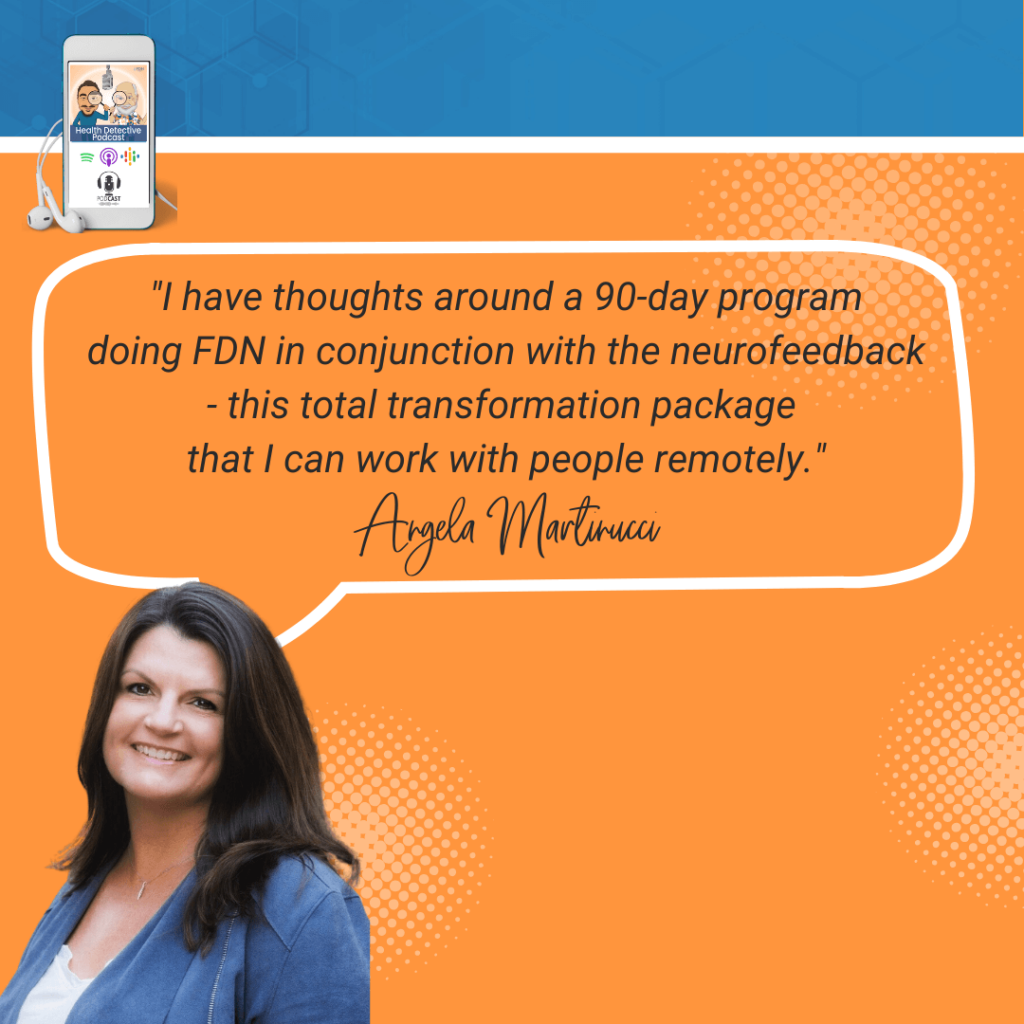
So, I still rent the neurofeedback equipment and ship it out. And I have thoughts around a 90-day program doing FDN in conjunction with the neurofeedback – this total transformation package that I can work with people remotely.
And then in the spa, I would say, gosh, we have a really large percentage of menopausal/ premenopausal women who are really looking for support.
Neurofeedback Discovery: Renting the Equipment
I’m looking at packaging something group wise with kind of workshops and testing. So, I just don’t know the bandwidth for working one-on-one. So, I’m just really looking at how we can package more of a group program.
[00:37:41] Detective Ev: You just mentioned something interesting, renting and shipping out the neurofeedback stuff. Tell me more about that. Especially tell me how, if I wanted neurofeedback processes done on me, how would I go about getting this if I’m on the other side of the country? I’m in Pennsylvania, you’re in San Fran. It’s like, how would that look?
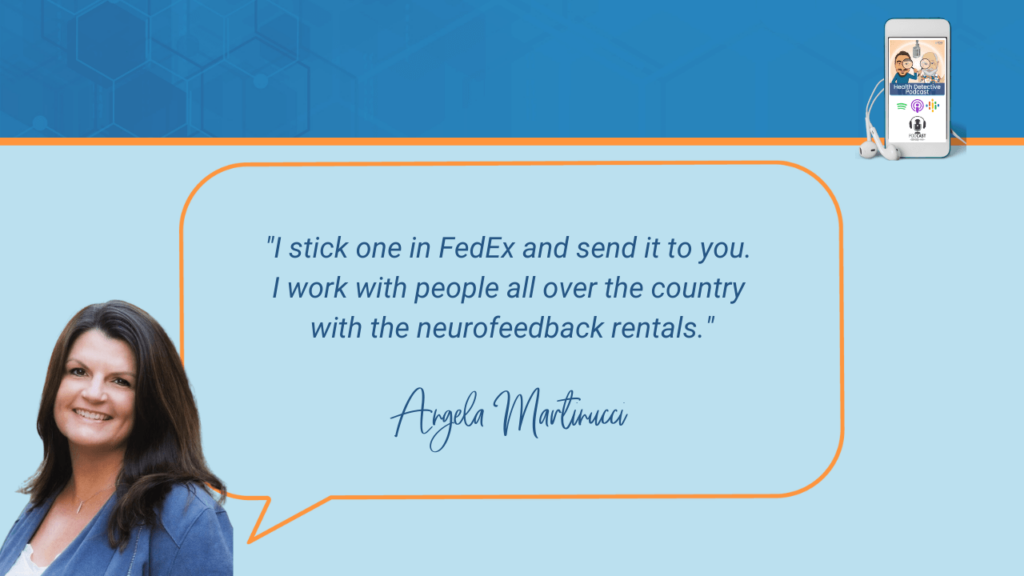
[00:37:55] Angela Martinucci: I stick one in FedEx and send it to you. I work with people all over the country with the neurofeedback rentals. So, I have multiple systems. You would book it on my website, and we would talk, and I would send it out. Then we would connect via zoom or phone or whatnot.
[00:38:13] Detective Ev: So, you’re telling me I can podcast live while getting neurofeedback.
Angela Martinucci: Sure.
Detective Ev: All right. You guys wait till episode 283, baby, because you never know what you’re going to see on this show, that’s for sure. I’m actually extremely interested in that. So, I’d love to know about where people can find you and stuff.
It’s amazing how fast this has already flown by. It’s always nice getting a brand-new topic that for me is just, I’ve never taken it in before. I’m like, we could do this for three, four fricking hours.
[00:38:38] Angela Martinucci: I know. I didn’t even hear about your studio.
Neurofeedback Discovery: Angela’s Ideal Client
[00:38:40] Detective Ev: Yeah.
Well, who do you like to serve now? You mentioned this in the bio already, but let’s say someone’s tuning in late or they skipped the intros cause that’s what they do. Who do you like to serve now? And who would best be suited to reach out to someone like you in terms of who you would like to support and can support?
[00:38:56] Angela Martinucci: I have this love for working with athletes and peak performers. So, I was working on site with athletes prior to the shutdown and then we opened the brain spa. We do see athletes in our center, but what I’ve seen go on in the clubhouses of professional sports teams is toxic. I can’t believe this is what they’re feeding and spraying on their bodies and whatnot.
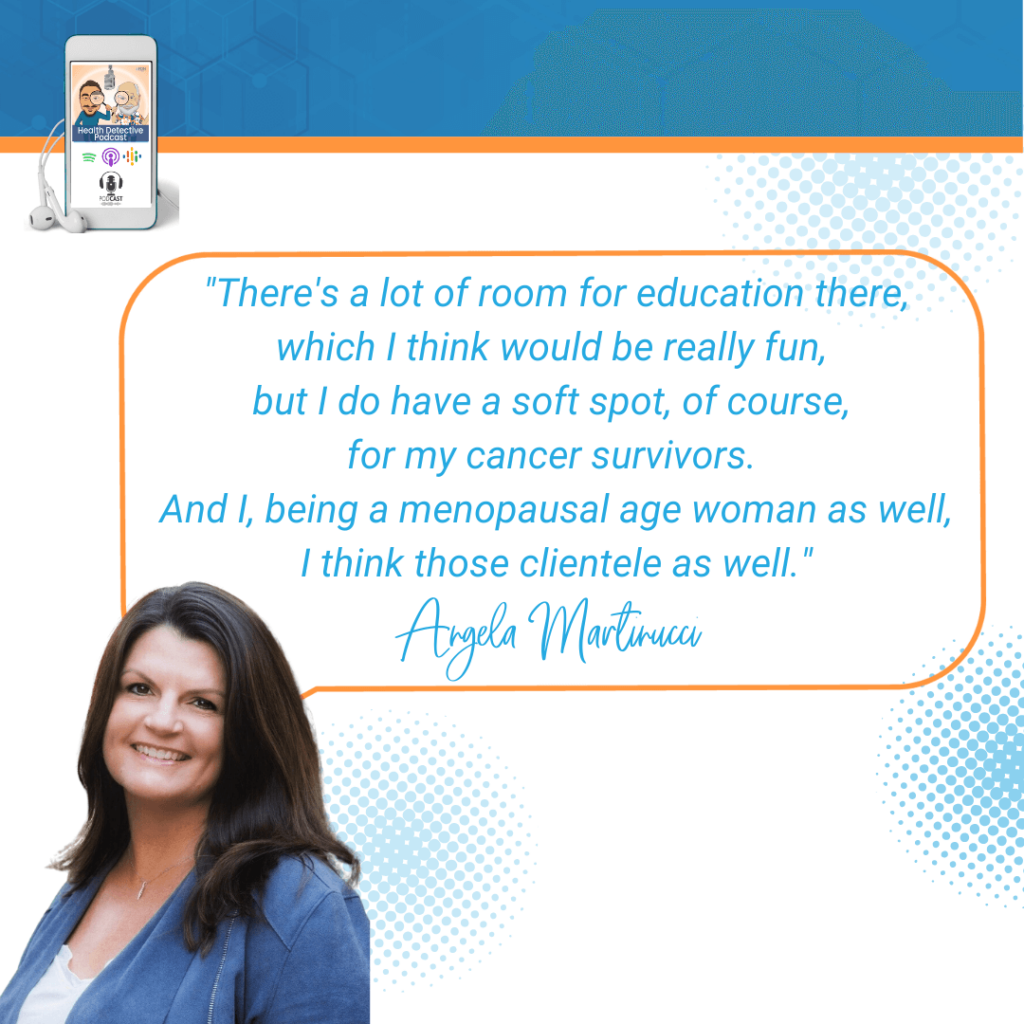
There’s a lot of room for education there, which I think would be really fun, but I do have a soft spot, of course, for my cancer survivors. And I, being a menopausal age woman as well, I think those clientele as well.
[00:39:35] Detective Ev: Then last thing, we chat out specifically where people can find you.
You obviously have a profound story here. We’re so thankful that you’re here with us, not only going through FDN, but man, just to have this story to share with others. That’s my favorite part of the podcast. We can get into the science all we want. I’m all for it. The stories to me mean the world. That’s what inspires people to take action and to give them hope that they can hopefully resolve their conditions too.
Neurofeedback Discovery: Client Testimonial
Do you have a favorite client testimonial that you’re able to share where like someone came into your spa and maybe they’re at the end of their rope and this is someone that you were really able to help and transform their life?
[00:40:10] Angela Martinucci: We see it all the time. People that are really suffering. I would say, we see a lot of anxiety. That’s big for people to move through that.
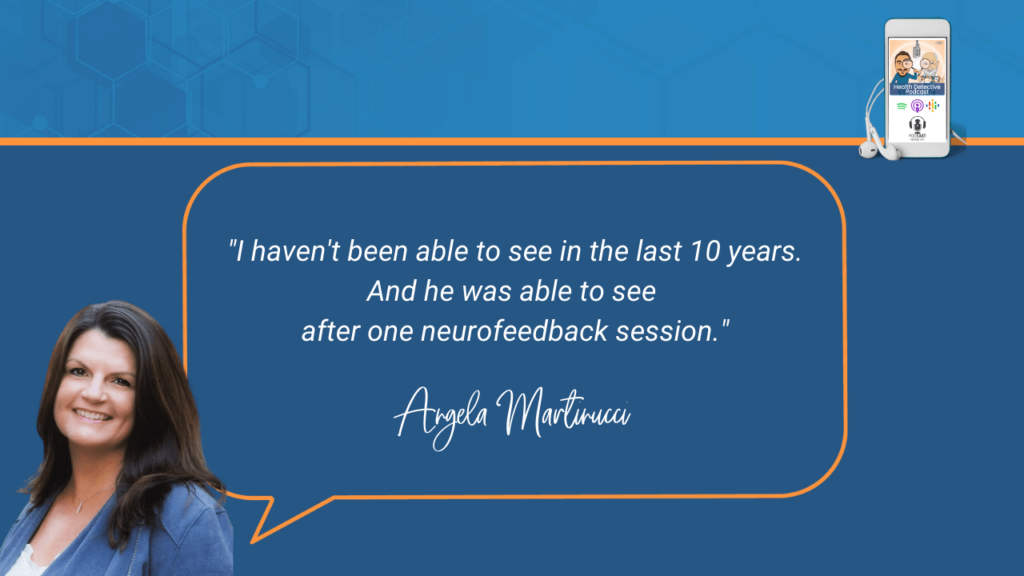
I have a crazy story that’s not super related. But I was running a retreat for a group of doctors, and we were running neurofeedback sessions on the beach. This one doctor did a session. He walked away and came back and goes, I know this is really weird, but before that session, I couldn’t see out of my left eye. I had a crushed eye orbital years prior from an accident. I haven’t been able to see in the last 10 years. And he was able to see after one neurofeedback session.
Detective Ev: Wow!
Angela Martinucci: It’s just bizarre, right? So, we’re just giving the brain information and his brain was able to like, okay, cool. I can turn on this pathway, and look, you can see.
[00:40:57] Detective Ev: You’d have to think, unless there’s literal physical damage, and even then, might still be relevant, what is all this healing, right? What tells my body, oh, fix this paper cut type of thing? That’s really fascinating.
I think again, it’s one of those things that’s hard for us to comprehend as just the human beings we are. But when you connect some of the stuff that we know to be true, that’s why I go back to the paper cut thing all the time. I’m like a broken record with it.
Neurofeedback Discovery: A Learning Process
But if you think about how profound that actually is that you have damage here and it fixed itself without telling it to do anything, it just knew what to do, I can see that. I can see that happening with someone like this that gets their sight back. Was it like full sight or just a little bit?
[00:41:39] Angela Martinucci: He’s like, I couldn’t see before this and then he could.
I always tell that story because you just can’t underestimate. People are like, what is it going to do for me? We’re giving information, we’re putting your brain in front of a mirror, so we just don’t know. We see all kinds of bizarre things that happen as a result.
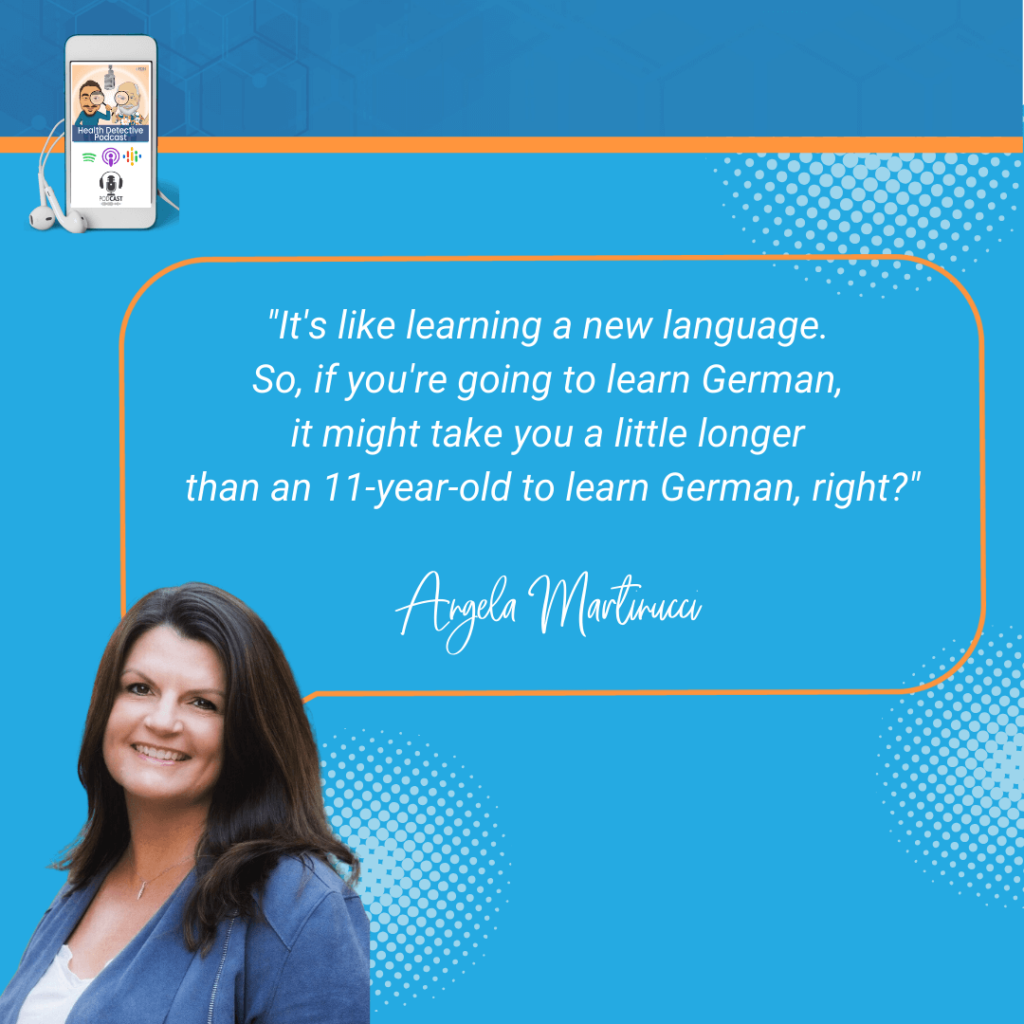
Some people, it takes a lot more sessions to see any progress and some people, it’s much quicker. It’s like learning a new language. So, if you’re going to learn German, it might take you a little longer than an 11-year-old to learn German, right? It’s a learning process.
[00:42:08] Detective Ev: As we wrap up here, first of all, thank you for coming on the show. It’s great to circle back with you now, post graduating FDN.
Angela is about as nice as can be. We had talked before when I was developing my health, wellness center, whatever you’ll call it. You were just beyond kind. Like you literally said, hey, we’d be happy to help you out. I can give you some advice on these types of things. I thank you very much for that.
Where can people find you though, if they would like to learn more about this neurofeedback stuff, talk to you, and perhaps even work with you?
Where to Find Angela Martinucci
[00:42:37] Angela Martinucci: I’ve got two different websites. You could reach out through either one. If you’re in the San Francisco Bay Area, come visit us at the Bay Area Brain Spa. You can find me that way.
Or if you want to reach out to me directly, you can reach out through Angela at MindBalanceNeuro. The MindBalanceNeuro site will get you directly to me. If you’re on Instagram, it’s bayareabrainspa or mindbalance_neurofeedback.
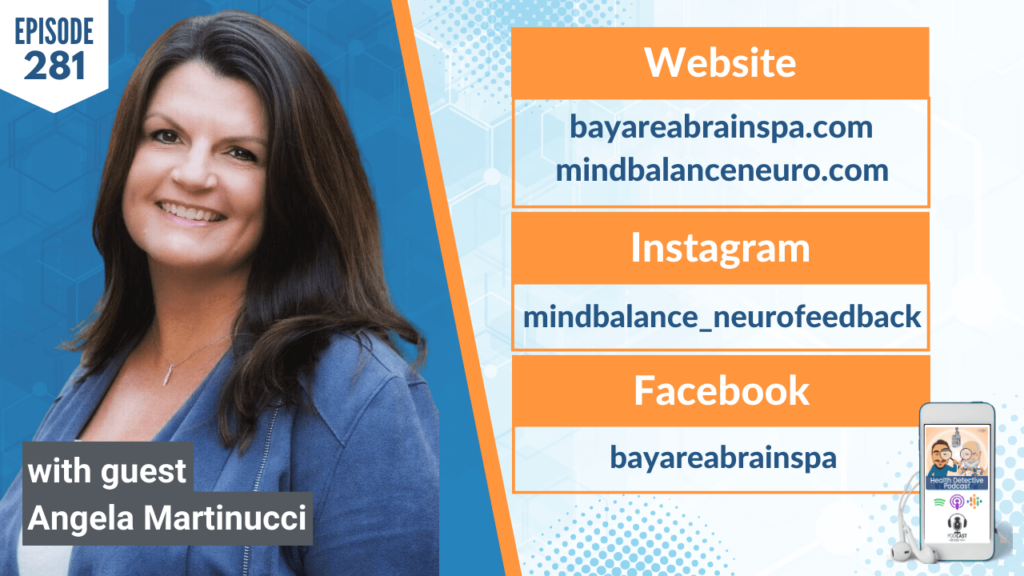
[00:42:57] Detective Ev: All right. And then our signature question on the show, my friend. If I could give you a magic wand and you could wave it, and now you could force every single person in this world to either start doing one thing for our health, or you can get us to all stop doing one thing for our health, what is the one thing that Angela would get us to do?
[00:43:18] Angela Martinucci: Nature and sunshine.
Detective Ev: Mic drop, period?
Angela Martinucci: That’s it. Yeah.
[00:43:25] Detective Ev: Awesome. Thank you so much for coming on. This might need a part two to dive even deeper into the neurofeedback stuff, but I really appreciate the introduction. We’ve never talked about this on the show, as far as I can remember, certainly not for a whole podcast.
Again, so glad you’re here. Congratulations on healing something that doesn’t happen to many people. We appreciate you.
[00:43:44] Angela Martinucci: Thank you so much. I appreciate it.
Conclusion
You can always visit us at functionaldiagnosticnutrition.com, on YouTube @FDNtraining, on Instagram @fdntraining, or on Facebook @FunctionalDiagnosticNutrition.
For more informational and functional health-oriented podcasts like this one, go to functionaldiagnosticnutrition.com/health-detective-podcast/.
To learn more about us, go to functionaldiagnosticnutrition.com/about-fdn-functional-testing/.

